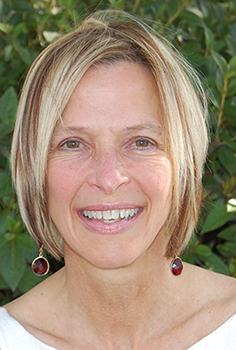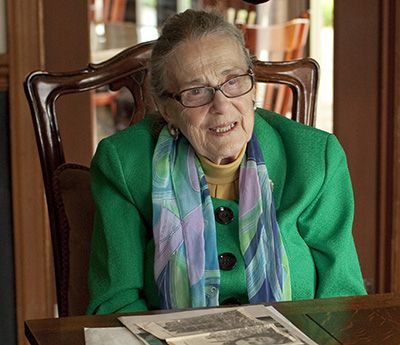
Lucy Henke
In her testimony in the Visual History Archive, Lisa Slater describes seeing a cattle car filled with Jewish men, women and children during the Holocaust– but unlike most survivors in the archive who remember seeing such a thing, she was never forced inside it.
Slater is one of the few “witnesses” to the Holocaust who gave testimony to USC Shoah Foundation – people who were not persecuted, nor acted as rescuers or aid-providers, but merely observed the events of the Holocaust unfolding around them.
Now, she is the subject of “On the Wrong Side,” a new documentary by Lucy Henke, associate professor of marketing at the University of Louisiana at Lafayette. The film is an official selection of the Fargo International Film Festival, March 15-19, 2016, and the Big As Texas Short Film Festival in December 2016.
Henke studies the social impact of mass media on attitudes and behaviors – a field that emerged after World War II as an attempt to understand the effects of propaganda. In addition to teaching at various universities, Henke has industry experience in public opinion polling, viewer perceptions of television programming, consumer behavior and marketing communication. She is especially interested in the impact of interpersonal and mass-mediated communication on children and adults.
A friend of Henke’s knew a woman named Lisa Slater, who had been a teletypist in the German army during World War II, and suggested that Henke make a documentary film about her. Henke was interested not only because Slater might be able to give insight into the effects of mass media, but also because she and Slater share a personal connection: Slater and Henke’s father were both born in Berlin between the first and second World Wars.
After Henke met Slater for the first time, she was hooked. She was captivated by Slater’s story and became committed to making a film about her.
“She was a remarkable woman with a fascinating story, and she conveyed a sense of urgency to have her story told in her lifetime,” Henke said. “One does not live to tell such a story without being an extraordinary person.”
Slater grew up in Berlin and was raised to be accepting and tolerant of everyone, including Jews. While Nazism took hold, her parents refused to boycott the Jewish-owned businesses they had always frequented, and Slater had many Jewish friends.
She became a teletypist for the German army because it was one of the few jobs available to young women during the war (under the condition from her father that she not join the Nazi Party) and served in Russia for two years before returning to Berlin. There, she and her then-partner Kurt Kleinfeld attempted to flee to Switzerland after the failed Hitler assassination attempt and were arrested. Kleinfeld was also a member of resistance groups.

To prepare for her own interviews with Slater, Henke watched Slater’s testimony in the Visual History Archive at Texas A&M University. She said it helped her familiarize herself with Slater’s story and also figure out what new ground could be covered in her own film.
Henke said Slater’s description in her film of the arrival of American soldiers in Russian-occupied Berlin is especially moving, because she was so ecstatic to see them by that point in the war.
“Some people who have watched the film are beyond welling up – they are sobbing at that point,” Henke said. “It is one of my favorite parts of her story.”
Slater, as a witness to the events that led up to the Holocaust, provides an important perspective on how a nation as strong as Germany could succumb to the Third Reich and its reign of horror.
“Lisa’s story may shed a modicum of light on the question of how ordinary citizens react when creeping government corruption, state-sponsored violence, growing government surveillance and loss of privacy create a mounting atmosphere of suspicion and fear,” Henke said. “What are the forces that interact to influence the day-to-day behaviors of ordinary citizens like Lisa?
“Optimistically speaking,” she added, “by understanding the factors that contribute to the loss of our humanity, we may prevent further inhumanity.”